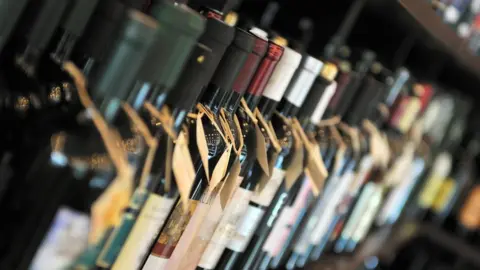Alcohol minimum pricing appeal begins at Supreme Court
The UK's highest court has begun hearing the latest appeal against minimum pricing for alcohol.
The Scotch Whisky Association's case against the measure is being assessed by the Supreme Court in London.
The policy was approved by MSPs at Holyrood in 2012, but has been tied up in a succession of court challenges amid claims it breaches European law.
The two-day hearing at the Supreme Court is the final point of appeal for the case in UK courts.
Ministers maintain that a 50p minimum price per unit of alcohol would help tackle binge drinking, with societal and health benefits. They want to implement the policy "as quickly as is practicable".
The Scotch Whisky Association (SWA) believes the proposed legislation contravenes EU regulations, potentially acting as a restriction on the free movement of goods, and argues there are better options already available to the government.
Former Justice Secretary Kenny MacAskill has told BBC Scotland he thinks the SWA's behaviour has been "disgraceful".
In October 2016, Scottish judges Lord Carloway, Lord Brodie and Lord Menzies ruled that the plans were legally sound.
However, in December the three judges allowed the association to go to the Supreme Court after hearing from the organisation's advocate Aidan O'Neill QC, who argued that the original ruling misunderstood European law.
 Supreme Court
Supreme CourtIn the initial exchanges of the two-day hearing in London, Mr O'Neill said the legislation was a "measure equivalent to a restriction on imports", therefore breaching European competition rules.
He said the Scottish government should seek the "least restrictive" approach available, saying the biggest question was "why not tax?"
The QC argued that there were other ways of raising alcohol prices - such as with increased duties or indirect taxes - which he said would be "more flexible" and more compatible with European rules, and which would result in "at least the same level of social protection and health benefits" which minimum pricing aims for.
'Hazardous drinkers'
Defending the legislation, Lord Advocate James Wolffe said it was targeted directly at "hazardous and harmful drinkers" who tend to consume alcohol which is "cheap relative to its strength", highlighting a "particular problem with cheap vodka".
He told the court: "The aim is not to reduce consumption for the sake of it, but to reduce alcohol-related harm. That is why the aim is expressed primarily in terms of targeting hazardous and harmful drinkers, as they are the drinkers who are most at risk of alcohol-related harm."
Mr Wolffe said increasing duties, as suggested by Mr O'Neill, would have a "disproportionate" impact on "moderate drinkers", who do not tend to consume many of the products affected by a minimum price floor. He said minimum pricing would be a more "balanced" approach to specifically target problem drinkers, and would work in a complementary way with excise duties.

Timeline: Minimum pricing for alcohol
 PA
PAMay 2012: MSPs pass Scots booze price plan
May 2013: Minimum drink price challenge fails
December 2015: Minimum drink price 'may breach EU law'
October 2016: Courts back minimum alcohol price
December 2016: Whisky firms allowed minimum price appeal

This latest development comes more than five years after the Scottish government introduced a bill for minimum pricing to Holyrood.
MSPs passed the bill, stating that retailers could not sell alcohol below a minimum price of 50p per unit, in May 2012.
Under the plans, the cheapest bottle of wine would be £4.69, a four pack of 500ml cans of beer would cost at least £4 and a bottle of whisky could not be sold for less than £14.
The new laws would be "experimental" and expire after six years.
The Scottish government, health professionals, police, alcohol charities and some members of the drinks industry believe the policy would help address Scotland's "unhealthy relationship with drink".
But the SWA has consistently objected to the legislation.
 Thinkstock
ThinkstockSpeaking on BBC Radio Scotland's Good Morning Scotland programme, Karen Betts, chief executive of the Scotch Whisky Association, said: "We believe that the minimum pricing of alcohol is illegal under EU law.
"Minimum pricing actually amounts to a trade barrier and this is a real concern for our industry.
"The success of Scotch really depends on our ability to sell successfully overseas, so if other markets respond by imposing similar barriers to free competition, Scotch will be damaged and with it the communities, the jobs which rely on the industry's continued success."
Scotland's Health Secretary Shona Robison said: "We're looking forward to the judgment of the Supreme Court on Minimum Unit Pricing and if it is the positive outcome we hope for, we will move as quickly as is practicable to put the policy in place."
Former Justice Secretary Mr MacAskill, who was one of the architects of the minimum pricing bill, said: "This isn't about protecting Scotch whisky, this about protecting cheap alcohol sales.
"What we have to remember is that members of the Scotch Whisky Association are also large alcohol producing companies and they are protecting their interests because somebody sells the cheap vodkas, somebody sells the cheap ciders and it's the same people that own and manufacture Scotch whisky."
